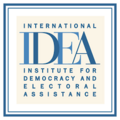Managing elections under Covid-19 pandemic conditions: the case of Ghana
Agbele, Fortune / Ghadafi SaibuExternal Publications (2021)
Stockholm: International IDEA
Elections in Ghana, as in other third-wave democracies on the African continent, are deemed critical because they can contribute to either improvement or reversal—even total breakdown —in a country’s democracy. Threats to democratic governance include delays, suspension or total cancellation of the electoral process: decisions that may be forced on election management bodies (EMBs) once unforeseen events have caused systems to malfunction. The outbreak of Covid-19 was one such unforeseen event, becoming a global pandemic and coinciding with at least 88 general elections to date. An April 2020 report by ECONEC (Economic Community of West African States, Network of Electoral Commissions) noted that the outbreak presented potential challenges to the conduct and management of upcoming elections within the sub region. Ghana is often seen as a beacon of democracy in Africa having held seven general elections and overseen three peaceful transitions of power from an incumbent to an opposition political party. The 7 December 2020 general elections, held amid Covid-19, were the country’s eighth cycle since 1992.


